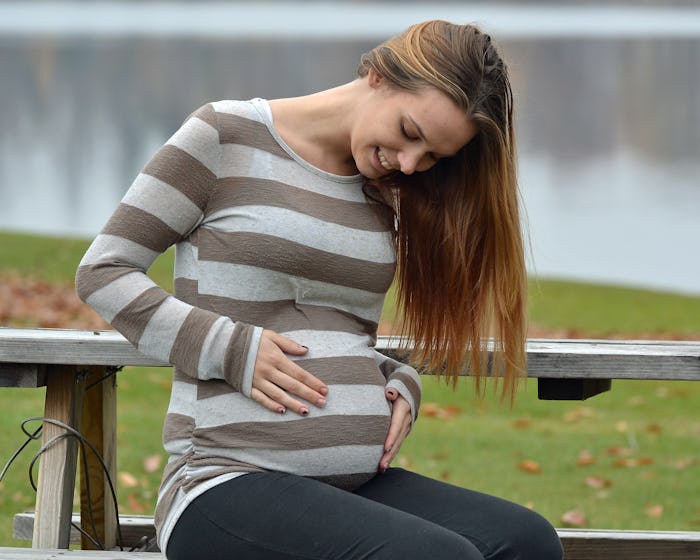Life
What Will Happen To Your Breasts During Pregnancy? 6 Ways Your Boobs Are About To Change
Everyone loves to talk about what you're going to do with your breasts after you deliver a baby, but your breasts change during pregnancy, too. You may have even noticed from the very beginning. Before I ever got pregnant, I was one of those women who could tell her period was coming just by the way my boobs felt. (They can also tell me when it's raining, just like in Mean Girls!) They would become achy and tender in the days leading up to my period, but that all changed when I became pregnant. Now they felt like bowling balls attached to my chest with nothing but dental floss. And as my pregnancy progressed, I began to leak colostrum, the precursor to breast milk. My boobs basically became alien-like to me.
According to Parents, all of the breast changes you might experience are totally normal, and are part of the process of your breasts getting ready to feed a baby. What to Expect notes the same facts, and attributes most of the changes and potential tenderness of your breasts to progesterone and estrogen. There's also a lot of fat building up in your boobs, along with increased blood flow as your breasts get ready to nourish a baby.
Even if you decide not to breastfeed, you're most likely going to feel some of these six changes to your boobs over the next nine months. A baby really does change everything, right?
1They're Going To Get Huge
And you're not even feeding a baby yet. Ladies, let me tell you, you may think it's going to be awesome to have enormous boobs, but it can get really old really fast. I had to wear a turtleneck to avoid showing cleavage.
Your breasts grow during pregnancy because estrogen and progesterone are adding fatty tissue to your boobs and increasing the blood flow to get ready to produce milk, notes What to Expect. But don't let size fool you. According to the same article from What to Expect, your breast size has no correlation with your body's ability to produce milk. Don't believe your breasts can grow all that much? March of Dimes notes that at the end of a pregnancy, the average woman will gain two pounds just in her boobs. Whoa, baby.
2They Are Tender AF
It's one of the earliest signs of pregnancy, breast tenderness, but it can continue throughout your entire journey to becoming a mother. And if you thought your SO was going to enjoy your giant boobs, you may now find yourself telling them they can't touch your breasts because OW. You can blame those pesky estrogen and progesterone hormones for this change, too. Nursing assistant Michelle Collins told Babble that the production of estrogen causes your mammary glands to respond and creates tenderness in your breasts. Dr. Shelley Binkley told Babble that progesterone also plays a role in your breast's tenderness, stimulating the breast glands to enlarge. And all of that growing and stretching can cause a lot of pain and make your boobs feel super tender.
3They Look Like A Blue Highway Map
For fair-skinned women, this change may be more noticeable, but all women may find that their breasts resemble a map of the country's highways — all in blue of course. Your blood flow increases by 20 to 40 percent while you're pregnant, and your veins have to carry all of that extra supply, along with nutrients for your baby, throughout your body, notes What to Expect. This can cause visible veins to appear, especially in your boobs as they prepare to become milking machines.
4Your Areolas And Nipples Look Darker
I remember reading somewhere that the darkening of your nipples and areolas could be a pregnancy sign, so when I was ready to have a baby, I spent way too much time holding up my shirt in front of a mirror to check my boobs. According to The Bump, no one really knows why this happens, but it could be because of the pregnancy hormones causing your skin's pigmentation cells to become more active, resulting in darker areolas and nipples. But don't worry, they'll fade back to their normal color after you deliver.
5They Start Leaking
When I was around five months pregnant, I passed out on my couch and woke up a few hours later with a soaking wet t-shirt on. I would not have won any contests, however, because my boobs were leaking colostrum. According to Parents, this thick, yellow liquid provides your newborn with antibodies and protein to ward off diseases and infections in the first few days of life before your milk comes in. But it's sometime between the end of the first trimester and your third trimester that your body begins to produce it, which accounts for the occassional leakage. Stuff a nursing pad in your bra if you want, or let it go and marvel at how amazing your body is.
6Your Nipples And Areolas Change Shape
So you've probably realized by now that all of these breast changes are happening for one reason — potential breastfeeding. And no change makes this clearer than your nipples changing their shape. Parents notes that your nipples may become more defined and stick out more, making it easier for your newborn to latch on. Your areolas will also change by developing raised bumps called Montgomery's tubercles, which are small oil-producing glands to keep your nipples and areolas from cracking or drying out during breastfeeding. You already knew it, but I'm going to say it again — boobs are amazing.
